

For the First Time, More People Get News Online Than From Newspapers. As of the end of 2010, more people get their news from the Internet than from newspapers — and more ad dollars went to online outlets than to newspapers, too.
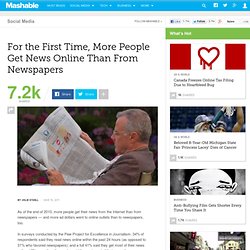
In surveys conducted by the Pew Project for Excellence in Journalism, 34% of respondents said they read news online within the past 24 hours (as opposed to 31% who favored newspapers); and a full 41% said they get most of their news online, 10% more than those who said they got most of their news from a newspaper. Of course, the 18-to-29-year-old group overwhelmingly cast their vote with the web; 65% said the Internet was their main news source. Pew's annual State of the Media report showed that the web was the second most popular source of news; local television news is still the number one source for the majority of people. «Un nouvel humain est né»: le branché. La majorité des Québécois ont accès à un ordinateur et à un branchement internet, la moitié possèdent un ordinateur portable et le quart, un téléphone intelligent.
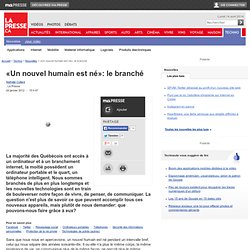
Nous sommes branchés de plus en plus longtemps et les nouvelles technologies sont en train de bouleverser notre façon de vivre, de penser, de communiquer. La question n'est plus de savoir ce que peuvent accomplir tous ces nouveaux appareils, mais plutôt de nous demander: que pouvons-nous faire grâce à eux? Sans que nous nous en apercevions, un nouvel humain est né pendant un intervalle bref, celui qui nous sépare des années soixante-dix. Comment va-t-on s'informer demain? Une semaine avec l'iPad. Voilà bientôt une semaine que j'utilise mon nouveau iPad.
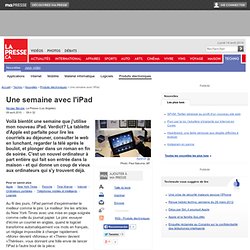
Verdict? La tablette d'Apple est parfaite pour lire les courriels au déjeuner, consulter le web en lunchant, regarder la télé après le boulot, et plonger dans un roman en fin de soirée. C'est un nouvel ordinateur à part entière qui fait son entrée dans la maison - et qui donne un coup de vieux aux ordinateurs qui s'y trouvent déjà. Au fil des jours, l'iPad permet d'expérimenter le meilleur comme le pire. Le meilleur: lire les articles du New York Times avec une mise en page soignée comme celle du journal papier. L'iPad est un outil construit avec minutie. Les médias traditionnels doivent multiplier les supports.
Les visiteurs du site internet du New York Times devront payer l'an prochain. - Photo: archives Reuters Les médias traditionnels seront obligés de multiplier les supports pour survivre et se développer dans une ère numérique en constant renouvellement, estiment plusieurs dirigeants du secteur réunis cette semaine à New York.
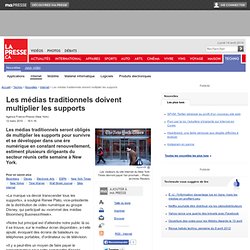
Defining the Publishing Industry. The Publishing industry generates a turnover in the region of £10.1 billion GVA (Gross Value Added) and is one of the biggest earners and exporters for the UK Creative Media Industries.
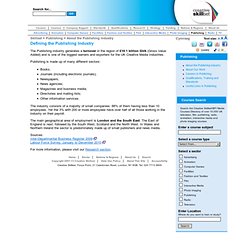
Publishing is made up of many different sectors: Books; Journals (including electronic journals);Newspapers;News agencies;Magazines and business media;Directories and mailing lists;Other information services. The industry consists of a majority of small companies: 88% of them having less than 10 employees. Yet the 3% with 200 or more employees have over half of all those working in the industry on their payroll. Publishing: Overview. Use the sectors to find jobs, courses, advice and information on specific subjects and areas of interest.
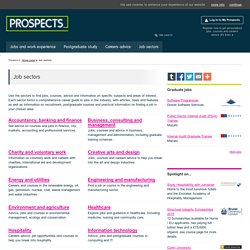
Each sector forms a comprehensive career guide to jobs in the industry, with articles, news and features, as well as information on recruitment, postgraduate courses and practical information on finding a job in your chosen area. Charity and voluntary workInformation on voluntary work and careers with charities, international aid and development organisations. Energy and utilitiesCareers and courses in the renewable energy, oil, gas, petroleum, nuclear, coal, waste management and water industries. HealthcareExplore jobs and guidance in healthcare, including medicine, nursing and community care. HospitalityCareers advice, job opportunities and courses to help you break into hospitality. LawA detailed career guide for anyone considering a career in law, plus training contract opportunities. Publishing. Traditionally, the term refers to the distribution of printed works such as books (the "book trade") and newspapers.
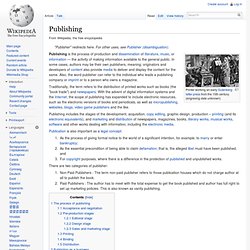
With the advent of digital information systems and the Internet, the scope of publishing has expanded to include electronic resources, such as the electronic versions of books and periodicals, as well as micropublishing, websites, blogs, video game publishers and the like. Publication is also important as a legal concept: There are two categories of publisher: Non-Paid Publishers : The term non-paid publisher refers to those publication houses which do not charge author at all to publish the book.Paid Publishers : The author has to meet with the total expense to get the book published and author has full right to set up marketing policies.
This is also known as vanity publishing. Publishing Industry. Book publishing in the United States grew from a single printing press imported from England in 1638 to an industry boasting more than 2,600 publishing houses and generating nearly $25 billion a year in revenue in 2000.
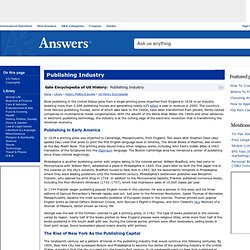
The country's most famous publishing houses, some of which date back to the 1800s, have been transformed from private, family-owned companies to multinational media conglomerates. With the advent of the World Wide Webin the 1990s and other advances in electronic publishing technology, the industry is at the cutting edge of the electronic revolution that is transforming the American economy. Publishing in Early America In 1638 a printing press was imported to Cambridge, Massachusetts, from England. Our Digital Book Future: Turning A New Virtual Page In Human Evolution. White Paper - For Website.pdf. Publishing Industry. Www.ebrc.fi/kuvat/ellonen_paper.pdf. Www.learnebusiness.com/ebusiness_articles/how-to-reshape-the-publishing-industry.pdf. Challenges Facing The Publishing Industry Including If And How To Monetize Content. To survive in the digital age, publishers must find engaging ways to re-package their content as products and services to be made available across multiple platforms, according to Nimble, a new Razorfish report published today.
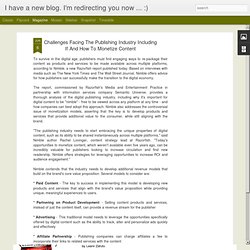
Based on interviews with media such as The New York Times and The Wall Street Journal, Nimble offers advice for how publishers can successfully make the transition to the digital economy. About the Publishing industry. The Evolution of Self-Publishing. Self-publishing books has become faster, easier and cheaper. Back in the 1970s, after your manuscript was completed, the printer would punch your manuscript out on tape and make corrections, and then run the punched tape through a type-setting machine—which was extremely time-consuming and expensive.
When the bill arrived in your mailbox, you’d have a difficult time deciphering whether you’d published a book or purchased South Dakota. And without Amazon or eBay, it wouldn’t be easy to sell, either. Today, with the advancement of desktop computers and printing technology, it’s quick and affordable. You can send your book off and have copies in 30 days for a few hundred dollars. Discovery and Monetization: Two Important Challenges Facing eBook Publishers.